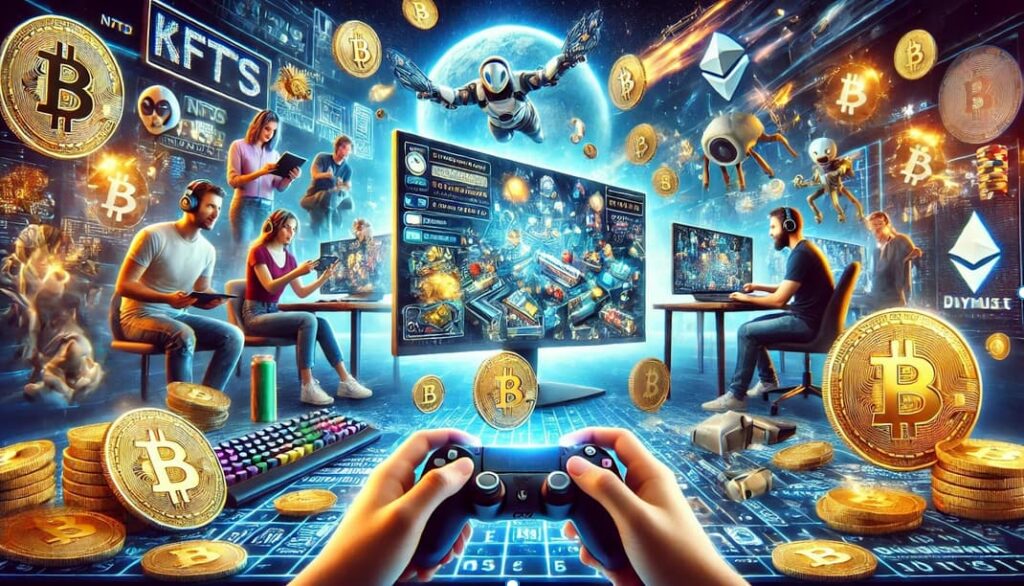Creating Cryptocurrency-Themed Games: Combining Fun and Finance
Creating cryptocurrency-themed games offers an exciting way to blend entertainment with financial opportunities. As cryptocurrencies like Bitcoin and Ethereum continue to gain mainstream attention, developers are increasingly incorporating these digital assets into the gaming world. Cryptocurrency-based games allow players to earn, trade, and even stake real-world value through in-game activities, adding an entirely new layer of excitement to gameplay. These games typically utilize blockchain technology to ensure transparency and security in transactions, making them more appealing to gamers who are looking for a seamless and rewarding experience. For players interested in managing their earnings, platforms like Exness for PC can offer efficient tools for cryptocurrency trading and portfolio management.
The growing popularity of non-fungible tokens (NFTs) is also playing a significant role in cryptocurrency-themed games. NFTs give players true ownership of in-game assets, such as skins, characters, or unique items, allowing them to trade or sell them in virtual marketplaces. This creates a tangible financial incentive for gamers to invest time and resources into the game, all while enjoying a fun and immersive experience. However, game developers need to strike a delicate balance between providing financial rewards and ensuring the game remains enjoyable. With the right design and monetization strategies, cryptocurrency-themed games can create a thriving ecosystem where both entertainment and finance coexist harmoniously.
Understanding Cryptocurrency
Cryptocurrency is a digital or virtual form of currency that relies on cryptography for security, making it nearly impossible to counterfeit or double-spend. Unlike traditional currencies issued by governments (such as the dollar or euro), cryptocurrencies operate on decentralized networks based on blockchain technology. A blockchain is a distributed ledger that records transactions across many computers, ensuring that all records are transparent, secure, and immutable. The most well-known cryptocurrency is Bitcoin, but there are thousands of others, including Ethereum, Ripple, and Litecoin, each with its own unique features and use cases.
What sets cryptocurrency apart from traditional currency is its decentralization. Rather than being controlled by a central authority like a bank or government, cryptocurrencies operate on peer-to-peer networks. This allows for more autonomy and, in many cases, faster and cheaper transactions, especially when sending money across borders. Cryptocurrencies can be used for various purposes, from buying goods and services to investing, trading, or even gaming. Their value can fluctuate dramatically due to market demand, making them both an attractive investment opportunity and a potential risk for users.
The Appeal of Cryptocurrency-Themed Games
Cryptocurrency-themed games have gained significant popularity due to their unique combination of entertainment and financial potential. One of the main attractions for players is the opportunity to earn real-world value through in-game activities. Unlike traditional games where progression is limited to virtual achievements, cryptocurrency-based games allow players to accumulate and trade digital assets, such as tokens or non-fungible tokens (NFTs), which can have tangible financial worth. This creates an added incentive for gamers to invest more time and effort into the game, as they can potentially monetize their skills and achievements. The concept of “play-to-earn” has made these games particularly appealing to those looking for new ways to earn passive income or engage in financial markets while enjoying their favorite pastime.
Additionally, cryptocurrency-themed games offer a level of ownership and control that traditional games do not. Blockchain technology ensures that in-game assets, such as skins, weapons, or characters, are unique and verifiable, allowing players to buy, sell, or trade them on external marketplaces. This adds a layer of excitement and exclusivity, as players can possess rare or valuable items that can appreciate in value over time. The integration of decentralized finance (DeFi) elements, such as staking or yield farming, further enhances the financial aspect, allowing players to earn rewards in cryptocurrency simply by participating in the game’s economy. With the blend of gaming and finance, cryptocurrency-themed games create a dynamic and immersive experience that appeals to both gamers and crypto enthusiasts alike.

Designing Engaging Cryptocurrency-Themed Games
Designing engaging cryptocurrency-themed games requires a delicate balance between entertainment and financial incentives. While the integration of digital currencies, NFTs, and blockchain can add exciting elements to the gaming experience, it is crucial that these aspects do not overwhelm the gameplay itself. The primary goal of a successful cryptocurrency-themed game is to provide an enjoyable and immersive experience that keeps players coming back. Developers should focus on creating captivating storylines, interactive gameplay mechanics, and rewarding progression systems that maintain players’ interest. The game should be fun first and foremost, with financial rewards acting as an additional layer of motivation rather than the sole focus.
Here’s a list of key elements to consider when designing engaging cryptocurrency-themed games:
Balanced Gameplay
- Ensure that financial elements (cryptocurrencies, tokens, NFTs) enhance the experience, but do not overshadow the fun and gameplay mechanics.
- Keep the game’s core entertaining and accessible, with rewarding progression systems.
Clear Incentives and Rewards
- Offer in-game rewards that hold real-world value, such as cryptocurrency tokens or tradeable NFTs.
- Create systems that encourage players to participate actively, such as staking or earning passive rewards.
User-Friendly Interface
- Simplify wallet management, token transactions, and other cryptocurrency-related actions for players who may not be familiar with blockchain.
- Include tutorials or guides to help newcomers navigate the cryptocurrency elements within the game.
Engaging Storyline and Mechanics
- Develop an immersive narrative and engaging gameplay that motivates players to keep progressing.
- Create gameplay loops that blend traditional gaming enjoyment with financial incentives (e.g., completing missions or challenges for cryptocurrency rewards).
Security and Transparency
- Implement strong security measures to protect players’ cryptocurrency assets and data.
- Use transparent blockchain-based systems for in-game transactions to build trust among players.
Ownership and Tradable Assets
- Integrate NFTs to allow players to truly own in-game assets (e.g., skins, characters, weapons).
- Enable trading of these assets within the game or on external platforms for real-world value.
Scalability and Longevity
- Ensure the game’s economy is scalable, with mechanisms in place to balance token supply and demand over time.
- Regularly update the game with new features, assets, and challenges to maintain player engagement.
Cross-Platform Play
- Make the game available on multiple platforms (PC, mobile, web) to reach a broader audience.
- Ensure that cryptocurrency transactions and in-game assets are synchronized across platforms.
Community Engagement and Feedback
- Create a community where players can discuss strategies, trade assets, and give feedback.
- Use community-driven events or updates to keep the game dynamic and player-focused.
Compliance and Legal Considerations
- Ensure the game complies with relevant financial regulations, especially regarding cryptocurrencies and NFTs.
- Address issues like age restrictions and gambling regulations, particularly if the game involves real-money transactions.
Monetization Strategies for Cryptocurrency-Themed Games
Monetization strategies for cryptocurrency-themed games can be diverse and highly effective if implemented correctly. Here are some of the key approaches:
In-Game Purchases (Microtransactions)
- Players can buy in-game currency (tokens, cryptocurrency) to enhance their experience. These purchases may include items like skins, characters, equipment, or special abilities.
- Offering both cosmetic items (which do not affect gameplay) and functional items (which might provide advantages) can cater to different player preferences.
Play-to-Earn Model
- The core idea behind play-to-earn is that players can earn cryptocurrency or NFTs through gameplay. They can sell or trade these assets in-game or on external marketplaces for real-world value.
- Examples include earning tokens by completing missions, reaching milestones, or winning player-versus-player (PvP) battles. This model directly ties the player’s effort to financial rewards.
Staking and Yield Farming
- Games can integrate decentralized finance (DeFi) features like staking and yield farming. Players can stake their cryptocurrency or in-game tokens and earn passive rewards over time.
- Yield farming might involve using in-game assets to participate in liquidity pools or other DeFi protocols that generate additional earnings for the player.
NFT Sales and Trading
- NFTs (non-fungible tokens) provide a way for players to own unique in-game assets, such as rare skins, characters, or land. These assets can be sold or traded on external marketplaces, and the game developer can take a commission on each transaction.
- Exclusive or limited-edition NFTs can drive demand and increase the value of in-game items, creating a profitable ecosystem.
Subscription Models
- Offering premium memberships or subscription-based access can provide players with additional benefits, such as exclusive content, rewards, or a greater share of in-game earnings.
- Subscriptions can offer a consistent revenue stream for developers while providing loyal players with enhanced experiences.
Ad Revenue and Partnerships
- Integrating advertisements, such as banner ads or in-game ads, can generate income, especially if the game has a large active player base.
- Partnerships with cryptocurrency exchanges or other blockchain-related companies can offer branded content or cross-promotional campaigns, adding another layer of monetization.
Tournaments and Competitions
- Hosting tournaments or competitions with entry fees in cryptocurrency can attract players who are looking to test their skills and win prizes.
- A portion of the prize pool can be funded by entry fees, while a percentage can be retained by the game developer as revenue.
Tokenomics and Initial Coin Offerings (ICO)
- Developers can create a game-specific cryptocurrency or token that can be sold during an ICO (Initial Coin Offering) or token sale. This can generate initial capital for game development and ongoing funding.
- Tokenomics should ensure a balanced supply and demand of the game’s tokens to maintain their value, ensuring long-term success.
Licensing and Merchandising
- In some cases, the popularity of cryptocurrency-based games can lead to licensing opportunities for branded merchandise or collaborations with other projects.
- Physical items or digital collectibles related to the game could be sold to generate additional revenue streams.
Conclusion
Cryptocurrency-themed games represent a groundbreaking fusion of entertainment and financial opportunity. By integrating blockchain technology, NFTs, and digital currencies, these games offer players a unique chance to not only enjoy immersive gaming experiences but also potentially earn real-world value. The ability to own, trade, and even stake in-game assets adds layers of excitement and ownership that traditional games cannot match. However, successful implementation of these games requires a careful balance between fun and finance, ensuring that the game remains engaging while also offering lucrative rewards. As the gaming industry continues to evolve, cryptocurrency-themed games have the potential to reshape how we think about both gaming and finance, creating new opportunities for developers and players alike.
